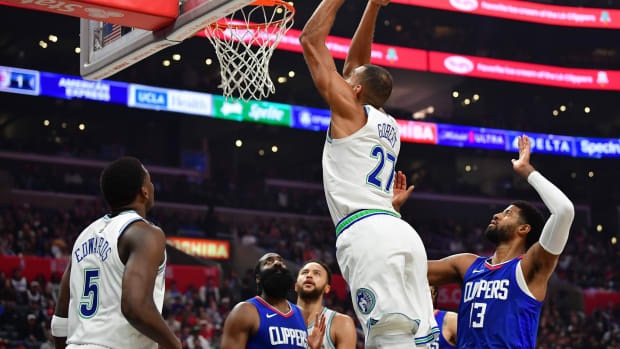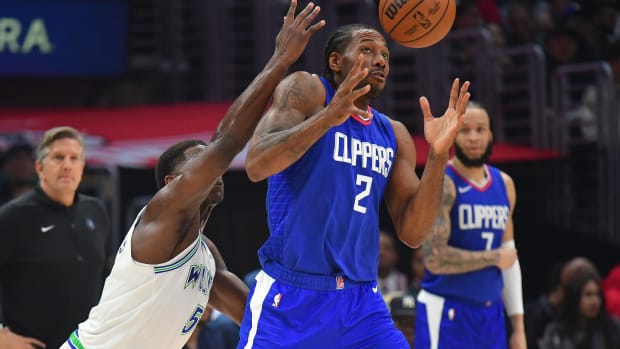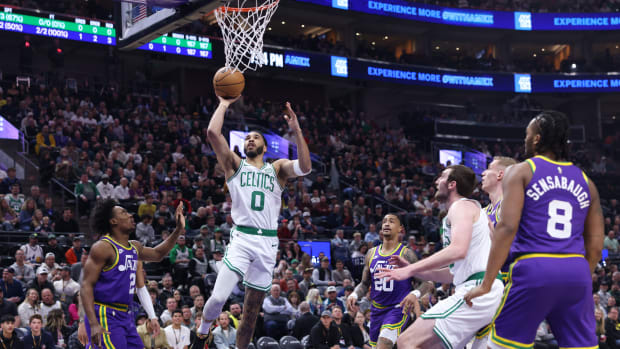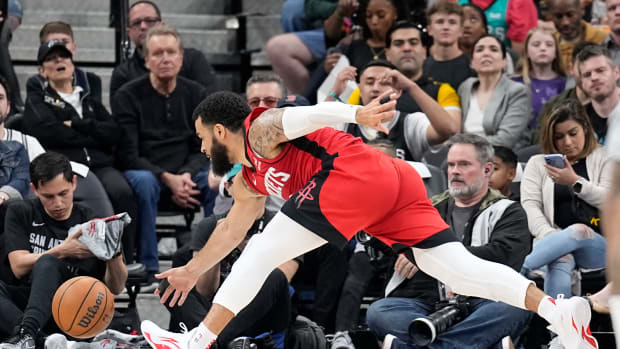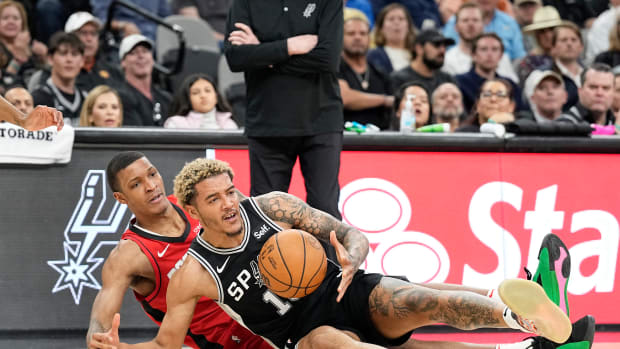Ja Morant and the Grizzlies Are Here to Stay
Despite boasting a regular-season profile traditionally held by a legitimate title contender—56 wins after a preseason over/under of 41.5, plus a top-five offense, defense and net rating—no team as young and seemingly top heavy as the 2021–22 Grizzlies ever actually won it all.
NBA champions are typically battle tested, with at least two stars supported by a wealth of experience. Memphis, though, is the league’s fourth-youngest team. A majority of the Grizzlies’ rotation is currently competing in just their third playoff series. Their two oldest players, Steven Adams and Kyle Anderson, are only 28, while 22-year-old Ja Morant is their lone All-Star.
Since the merger, the 1977 Trail Blazers are probably the closest parallel that actually went on to win a title. They were the second-youngest team in the league that year, coming off a season in which they didn’t even make the playoffs. But in addition to having a third-year megastar in Bill Walton, Maurice Lucas technically gave them a second All-Star. The '79 Seattle SuperSonics are another possible comparison. They were led by two young guards (Dennis Johnson and Gus Williams; neither made All-NBA and only Johnson was an All-Star). However, they were the 15th-oldest team in a 22-franchise league.
Fast forward through two and a half decades primarily dominated by the Celtics, Lakers, Pistons, Bulls and Spurs, and then we get to the 2006 Heat. Dwyane Wade, like Morant, was their third-year catalyst and best player who led them to a championship by mercilessly attacking the rim and drawing a number of fouls people in Dallas still don’t believe ever happened. Those Heat were also blessed by Shaquille O’Neal’s swan song. They were pretty old. Alonzo Mourning, Gary Payton, O’Neal and Jason Williams were all on the wrong side of 30. Their head coach was Pat freaking Riley.
Skip ahead 10 years and we come to another champion these Grizzlies can kinda, sorta see in themselves: their current opponent. But in 2015, Stephen Curry, the league MVP, was in his sixth season. They had veterans and journeymen all over their roster: Andre Iguodala, Andrew Bogut, Shaun Livingston, Leandro Barbosa and David Lee.
Before Morant suffered a bone bruise in his knee that’s likely to end his season, Memphis had a chance to set a new precedent by accomplishing something no team that looked like them ever had. Down 3–1 in Round 2 after a gritty three-point loss in Game 4 (without Morant) against the core pieces of a generational dynasty, Memphis has to beat Steph Curry, Draymond Green and Klay Thompson three straight times to keep their dream alive.
Morant’s injury all but guarantees that won’t happen. But their run up until then foreshadows something great down the line, assuming they’re able to stay together and sustain some of the critical characteristics that most young teams never discover—or take several more years to learn.
When asked whether any team throughout league history reminds them of themselves, Grizzlies players and coaches either shake their head or throw out examples that never actually did what, only a few days ago, they were far more credible to do.
“That Oklahoma City team when KD, James Harden and Russ [Westbrook], all those guys were young and fairly new,” Desmond Bane tells Sports Illustrated. “Other than that, I don't know too many other teams that were young and seen as title contenders.”
That Thunder team never saw the mountaintop, of course.
Anderson, meanwhile, sees stylistic similarities between this group and how his former team operated, which is fascinating when you consider the age and achievement gap.
“I think on the court, we remind me a lot of my third-year San Antonio Spurs team. I think we won like 60 games or whatever. We were really good, but we had like two All-Stars, NBA Hall of Famers on that team,” he tells SI. “This team reminds me a lot of that team in a sense of how we handle business on the court, how we play together, share the ball, play defense.”
Young teams normally don’t persevere for a variety of reasons, one being it’s hard to keep everyone on the same page. League history is littered with the bones of ascending juggernauts and potential dynasties that fractured below the weight of vastly differing priorities. The pieces on this Grizzlies roster fit, but there’s also a degree of egolessness that’s entirely foreign to a cluster of players who are either still on their first or second contract, earning well below their market value. They’re mature and willing to sacrifice, necessary ingredients and fragile hallmarks that have helped bump Memphis way ahead of schedule.
“This is the closest team I’ve ever been on,” Anderson says. “We all enjoy each other’s company and, I don't know, it’s special. You don’t see something like this on every NBA [team]. There’s normally always one bad apple or something like that. We don’t have anything like that. [Normally] guys want to get paid and they want to get their money, but I don’t think people are worried about that. I think the more we win, the more team success we have, guys are gonna get their individual payments or whatever the hell they want.”
Taylor Jenkins, who is only 37 and in his third season as a head coach, doesn’t get into comparisons but knows his team was built with preternatural selflessness that’s allowed them to bypass some of the shortcomings that accompany NBA infancy.
“I like to just talk about the uniqueness of this team. We’re super competitive. We’re super together,” Jenkins said. “Yeah, we’re young. We’ve got a swag to us. The fact that our guys have really embraced, in now my third year, the emphasis on being really good on both ends of the floor, that's going to get you to this point. It’s pretty impressive.”
Positive culture starts with the front office and coaching staff, but wouldn’t be possible without Morant.
If you’re looking for a reason to believe in these Grizzlies for the foreseeable future, it’s him, a messianic force with top-shelf intellect that’s elevated by supreme confidence and transcendent athleticism. “When he gets past you, he jumps so high it’s like he’s 6'10",” observed Timberwolves forward Jaden McDaniels.
On the court, Morant is a feverish ad lib, swiftly dancing ahead of the beat, rearranging the game’s entire rhythm with his own genius. “He sees plays before they happen,” Morant’s college roommate Shaq Buchanan told SI.
Jackson elaborates, dissecting how Morant goes surgical on pick-and-roll coverages at a blinding speed. “He’ll ball-fake and then the whole defense moves because of that ball-fake, and then the pass to the corner will be open. But because he’s so smart, he’s already thinking ahead of that. He’ll ball-fake, go to pass it to the corner, and as soon as he goes to pass it to the corner, he’ll just shoot it because he knows that they got faked out. So now they’re trying to recover to the corner to get the pass, and he knows that’s where they’re going, so he’s already now thinking about scoring. And no one’s even contesting because their minds are all over the place. They’re not ready to keep up with him mentally. They’ve already lost. The ball is in the air, and you’re thinking about it, but you can’t do anything about it.”
Jackson regularly picks Morant’s brain. As a big man who’s spent much of the season on the perimeter, Jackson regularly treats Morant as a resource. They talk about ball-fakes, angles, how to create space with a live dribble and the importance of dictating terms when attacking one-on-one.
Morant inhabits unteachable leadership qualities that make teammates follow him without second thoughts. They see his work ethic, how he treats people and the conviction he has in his own ability. “It's hard to stay in front of me, obviously,” Morant said when I recently asked about his ability to draw fouls. “So, you gotta do something to stop me.”
Blended with inherent fearlessness that’s deeply ingrained in how the entire team functions, Morant helps make Memphis such a difficult team to put away. Their offensive rating in crunch time during the playoffs is 123.5, second only to the Suns. “He’s an uncanny shotmaker,” Timberwolves coach Chris Finch said during the regular season. “You don’t want to get into a close battle with him. He’s gonna make tough shots, he has an ability to get to the free throw line. He reminds me of a young Chris Paul in that way.”
There was skepticism coming into the playoffs about whether the Grizzlies’ offense could be efficient enough in the half court, assuming they wouldn’t have the same amount of second-chance opportunities or wave of transition buckets that lifted them during the regular season. Short of Bane (who’s one of the five best shooters in the world), Tyus Jones and an occasional streak of timely makes from Dillon Brooks, they would have to go small to create space, short-circuiting the size advantage they leaned into all season.
(Brooks remains public enemy No. 1 for committing a hard foul in Game 2 that fractured Gary Payton II’s elbow. For better and worse, he also plays as if failure isn’t possible, perpetually embodying the mentality of a warthog that’s about to fight a snowman. In the first round that anti-hesitation was critical in dire circumstances. In Game 4 against the Warriors, when he went 5-for-19 with a few costly turnovers, not so much.)
Some of those concerns have proven true. After Monday night, Memphis’s overall offensive rating was 109.1 (11th out of 16 teams) and they’ve made only 33.3% of their wide-open threes. But some of what they do has still translated. The Grizzlies’ transition frequency off live rebounds is 34.9%, which leads the playoffs. During the regular season, when they finished second only to the Raptors, it was 34.6%. Their first-place offensive rebound rate in the regular season is down in 10 playoff games, but still fourth-best.
More important than all that, though, has been their work on the other end. “We play defense, and that’s gonna take you a long way in the playoffs,” Anderson said with a laugh when asked whether he thought their regular-season habits could be as consistently successful in a seven-game series. “We don’t pay attention to those people who are big-time media guys who don’t know much about the game. That stuff doesn’t really creep into our locker room. We know what we can do. We know what we’re capable of.”
Through 10 games, Memphis has held the Timberwolves and Warriors to 108.2 points per 100 possessions. Only the Bucks, Heat and Celtics have been more stout. (Also, for reference, the Rockets generated 108.1 points per 100 possessions during the regular season.)
There’s little reason why this won’t carry over to 2023. Everyone is under contract next year except Anderson and Jones (who’s restricted). The Grizzlies have options. They can bet on internal growth and run it back with some kind of win-now reinforcement (likely a shooter with size) via the full mid-level and biannual exceptions. Or they can renounce all their cap holds and have a little under $20 million to spend in free agency. They also own all their first-round picks, plus a couple of extra ones from the Jazz and Warriors (in 2024). If Memphis wants to go the trade route, it can attach one or two of those picks to some salary (like Adams’s expiring $17.9 million contract) and see what’s out there. (Duncan Robinson, Harrison Barnes and Bogdan Bogdanović are intriguing albeit long-shot targets at that price point.)
The Grizzlies have spent all season defying clichés and traditional norms. In so many ways, what they’ve already done is rare beyond measure. A championship feels out of reach because 1) 3–1 deficits are a mountain and 2) history says it’s impossible for a team with so little experience to win their final game. But if anything can be gleaned from a season that can best be described as enchanting, it’s that this iteration of Memphis should eventually be the last team standing, much sooner than you probably think.
More NBA Coverage:






























